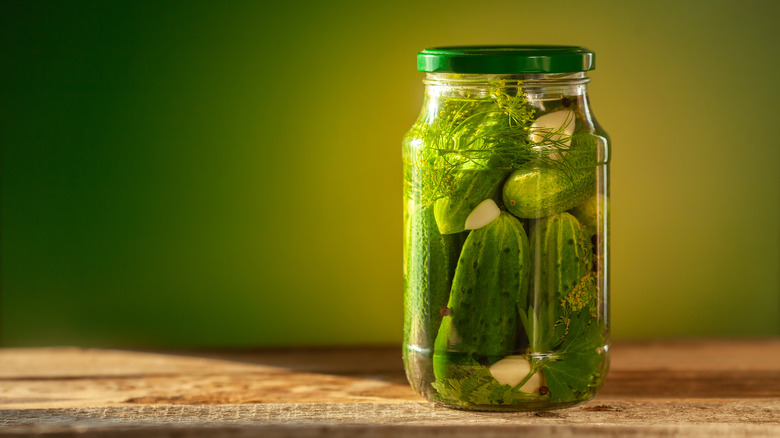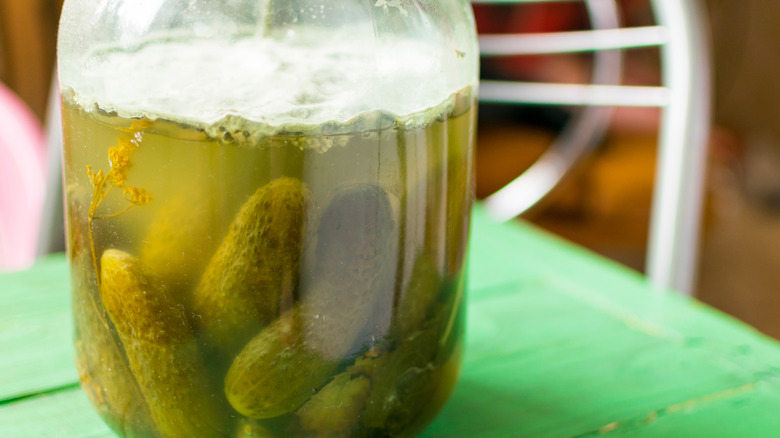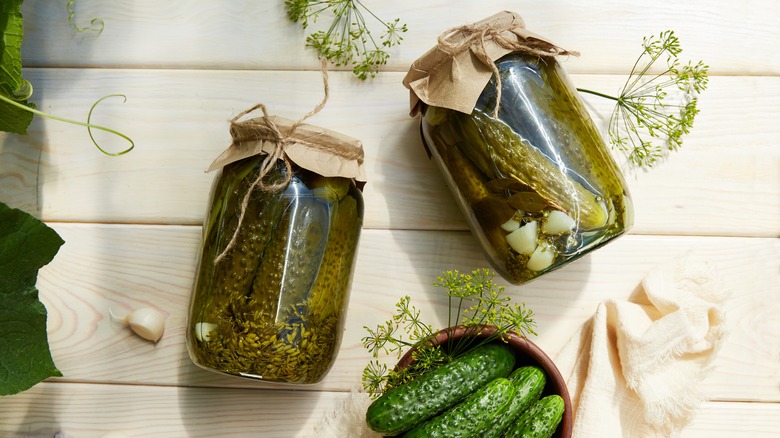How Long A Jar Of Pickles Lasts In The Fridge Once It's Opened
Ahh, the crunch and zing of a perfectly pickled cucumber. From bite-sized gherkins to hefty dill spears, these sensory delights elevate everything from burgers to bloody Marys. When they're fresh, they're oh-so-good, but just because pickles are pickled doesn't mean they can't go bad. Once you open a jar, it doesn't have an unlimited lifespan, but it may last longer than you think — anywhere from one to three months in the refrigerator.
Rest assured pickle lovers, these briny bites are still among the safer bets in your fridge when it comes to the risk of foodborne illnesses. The USDA — which has a lot to say about pickles — notes that thanks to rigorous food safety standards and the inherent preservative nature of pickling, pickle-related illnesses are extremely rare. However, since they are capable of going bad, it's important to know the difference between a perfectly pickled cucumber and one that's past its prime.
Why good pickles go bad
To understand why pickles spoil, we need to know a bit about how they're made. The pickling process uses a precise balance of conditions and ingredients to preserve food. There are a few common methods for making pickles, each affecting how long they stay fresh. And while there are various pickled foods out there, our focus here is on the classic cucumber pickle.
Brined pickles, often the type found in grocery stores, are created using a calculated mix of vinegar and water. This balance ensures a safe pH level, inhibiting the growth of harmful bacteria. Fermented pickles, another variety, use bacteria for good by using the lactic acid produced during fermentation to preserve the cucumbers. Quick pickles, a simpler version, involve pouring hot brine over vegetables, making them a convenient but shorter-lived option.
Regardless of the method, spoilage occurs when conditions are right for bacteria to thrive. If the temperature is too warm, oxygen levels are too high, or the pH levels are off, bacteria will be fruitful and multiply. The typical signs of bacterial infiltration — a bulging lid, visible mold, fizzy brine, or changes in taste, texture, or color — are universal indicators across all pickling methods that it's time to discard your batch.
Preserving pickle perfection
When it comes to pickles, their longevity isn't just about how long they've been in the fridge. Their ingredients and preparation methods influence their shelf life too. Shelf-stable jarred pickles may contain preservatives like sodium benzoate that extend their freshness. For example, Mt. Olive (a popular jarred brand that contains preservatives) assures that their pickles can be enjoyed past the best-by date if they still taste fine. On the other hand, Grillo's Pickles (a refrigerated brand with no preservatives) recommends sticking to the best-by-date.
Homemade pickles also come in various forms with unique shelf lives. You may choose to make a more time-intensive pickle recipe by fermenting or canning them, or you might opt for quick refrigerator pickles. Refrigerator pickles are the shortest-lived, lasting a maximum of four weeks, while canned and fermented pickles last much longer, sometimes up to six months.
The key to keeping any pickle fresh is proper storage. Before opening, ensure they're kept in a cool, dry place. Once you've opened a jar, marking the date on it can help you track how long it's been refrigerated. In the fridge, maintain conditions that deter bacterial spoilage, like ensuring they stay cold and submerged in the brine. If you have a jar of pickles that's nearing its expiration date, you can even get adventurous and try making pickle popsicles to preserve them. These practices will help ensure that each pickle from the jar remains as delightful as the first.


